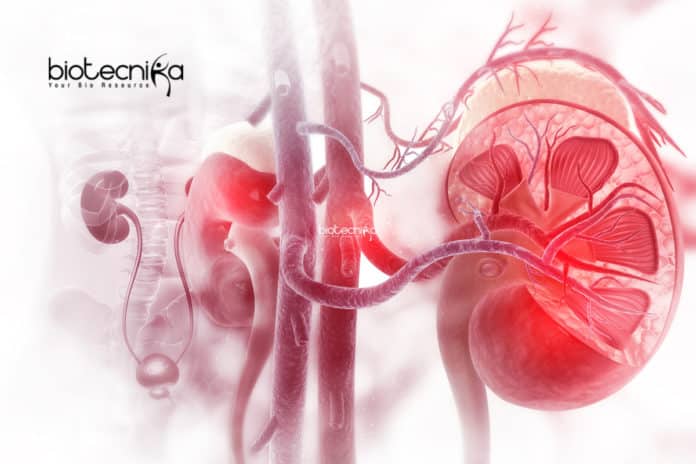Stem Cell Grown Mini Kidneys has paved the way for researchers to tailor treatment plans specific to each patient, which could be extended to a wide range of kidney diseases.
A team of Medical researchers from the Nanyang Technological University, Singapore (NTU Singapore) has grown ‘mini kidneys’ that could be used to understand better how kidney diseases develop in individual patients. These mini kidneys also called kidney organoids, were grown in Laboratory from skin cells derived from a single patient who was suffering from polycystic kidney disease.
Polycystic Kidney Disease is one of the most common causes of kidney failure in adults. The Mini Kidneys were grown outside the body from skin cells derived from a single patient who was suffering from Polycystic Kidney Disease.
The researchers reprogrammed these skin cells to obtain patient-specific pluripotent stem cells. These skin cells, when supplemented with right conditions, can develop into kidney organoids similar to human fetal kidneys. This took around three to six months for complete development.
The Stem cell mini kidneys were then used to validate the therapeutic effects of two drug molecules. They had the potential for treating genetic polycystic kidney disease. This study demonstrates that the research could be
of significant value in developing personalized treatments for people with this disease.Scientists have paved the way for tailoring treatment plans specific to each patient, which could be extended to a range of kidney diseases by generating induced pluripotent stem cells from an adult patient with genetic kidney disease and then growing kidney organoids from them.
Xia Yun and her team led this research work at the Nanyang Technological University, Singapore. She said that patients genetic makeup played a crucial role in the development of kidney disease. They type of mutation within the disease-causing gene differs from patient to patient. She highlighted the role of mini kidneys grown with the help of stem cells to administer drugs for a specific patient suffering from Polycystic Kidney Disease. The researches believe that this approach can be followed to study other types of kidney disease such as Diabetic Nephropathy.
Professor Juan Carlos Izpisua Belmonte, an international collaborator of this study, said, that this study has made a small step closer to using these kidney organoids for replacement therapies.
The kidney organoids developed by Prof Xia Yun and her team may also offer new insights into human kidney development. While the origin of kidney blood vessel networks is not fully known, it is widely accepted by the scientific community that a specific type of stem cell known as ‘vascular progenitors’ is involved in their formation by developing into blood vessel cells.
The NTU-led team also discovered a new source of stem cells called the Nephron Progenitor Cells. These stem cells are known to contribute to making these blood vessel networks. Before this discovery, these cells were known only as precursors to nephrons, the kidney’s filtering units.
Foo Jia Nee, NTU LKCMedicine Assistant Professor, said that by using this novel organoid platform, researchers unexpectedly discovered a new source of renal blood vessels that may improve our understanding of kidney development.
The mini kidneys may also be used to understand the development of nephrons in the kidney better. Some new known facts about kidneys which researchers found are that the number of nephrons at birth is inversely related to the incidence of hypertension and kidney failure later in life. They also noticed that being born with a high nephron number appears to provide some degree of protection against these conditions.
Dr. Jonathan Loh Yuin-Han a Stem cell scientist, senior principal investigator at the Institute of Molecular and Cell Biology at the Agency for Science, Technology, and Research said that this study represents a massive transformation in this field. These Mini Kidneys are anatomical, and functional hallmarks of the real organ hence provide deep insights into the kidney developmental processes.
Understanding the inner workings of a diseased kidney with the help of Mini Kidneys
To study the effects of genetic polycystic kidney disease, Prof Xia and her team first took regular adult cells from an adult patient suffering from this disease and genetically reprogrammed them into stem cells.
As an adult human body does not have any Kidney Stem Cells, the creation of these induced pluripotent stem cells is necessary.
These organoids developed fluid-filled cysts that are characteristic of the disease four to five weeks later. This signaled that they were ready to be used to test the efficacy of potential drug candidates for drug development.
When these mini kidneys were implanted into mice, the blood vessel network of these organoids successfully connected with the host mice circulation system. Later, they developed a more mature organ that is capable of preliminary filtration and reabsorption.






























